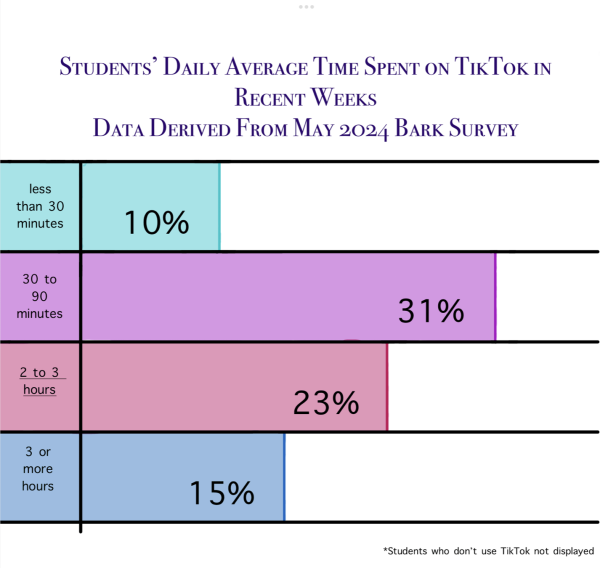
Ozempic. A weight loss drug, which first gained attention in 2021 due to celebrity use. However, those who use it are often seen as taking the “easy way out,” and those considering it may feel hesitant or embarrassed. Despite this, there are multiple benefits this drug holds — benefits that have sparked conversation around Ozempic and its weight loss effect, particularly in the context of the ongoing obesity epidemic.
Ozempic’s main ingredient is called semaglutide, which belongs to a class of medications known as GLP-1 agonists. These medications mimic leptin, the naturally occurring hormone that signals the feeling of being full to the brain. It also slows digestion, thus making people feel fuller for longer.
Jason Talbert, a Doctor of Medicine(MD) at Preferred Medical Group in Troy Michigan, explained how the medicine was first discovered from studying the saliva of the Gila monster, a type of giant lizard. These animals only eat three times a year due to the amount of semaglutide present in their bodies. Ozempic was originally approved by the FDA in 2017 to aid patients with type 2 diabetes but is now widely prescribed as an appetite suppressant for weight loss.
Patients typically take Ozempic in the form of a weekly injection, starting with a low dose with a possible gradual increase depending on the patient’s needs. These shots are typically painless, with a very small and thin needle injected into the abdominal wall.
According to Talbert, the results of taking Ozempic can be striking; the majority of patients prescribed it see weight loss of 20 to 30 pounds. Patients who start at weights of 300 pounds or more could lose up to 70 or 80 pounds.
Tara Tidy, a hair salon owner in Malibu, began using Ozempic after hearing about its weight loss success from friends and clients and after struggling with her weight for her entire life. While on the drug, she has found its influence on her eating habits to be helpful.
“I’ve been on every diet all my life, trying everything. Of course I wanted to try [Ozempic], because it definitely helps [people] to lose weight,” Tidy said. “It curbed my appetite from wanting to [over]eat and that was brilliant. I am a social eater, and I eat off of my emotions.”

Patients with diabetes or obesity face a higher risk of other health problems, particularly heart disease. However, research has shown that semaglutide can offer health benefits for people at risk of cardiovascular problems. It has also been shown to reduce the risk of strokes, heart attacks and high blood pressure.
In addition to its heart health benefits, Emily Mullin, a Knight Science Journalist from the Massachusetts Institution of Technology (MIT), described how Ozempic has been linked to reduced sleep apnea and a lowered risk of obesity-related cancers. She even found studies that suggested that the drug protects the kidneys, has the potential to treat addiction and can slow the cognitive decline that comes with dementia.
Harlan Krumholz, a cardiologist at Yale University, emphasizes the evolving perspective on obesity medications.
“Many of us in the medical community are beginning to think about these drugs as health promotion drugs, not just weight loss drugs or even anti-obesity drugs,” Krumholz said.
However, as with any medication, there are side effects. The most common ones include nausea, headache, diarrhea and abdominal discomfort. A survey conducted by the University of California, Los Angeles (UCLA) Health found that 45 percent of patients reported nausea, a symptom that can make the experience of using Ozempic unpleasant for some users. Despite this, many people, like Tidy, find that the side effects are manageable.
“I didn’t have a problem with [the side effects]. My doctor gave me some nausea pills to take [after the shot] and I took them the first time thinking ‘I’m going to be really nauseous’, and I wasn’t. I never was,” Tidy said.
While the drug has shown effective results, another possible side effect may be muscle loss, as Talbert explained.
“There is some concern that some of the weight loss that people are getting is muscle loss. But, I think you’re looking at muscle loss when you’re having somebody that’s not working out while taking it,” Talbert said.
Some believe that due to the effectiveness of this drug, users may start to rely on it as their way of keeping healthy. However, Talbert believes that this isn’t a problem.
“There is not a true dependency, because it’s not like you [have] withdrawal from going off of it. As long as it’s not causing any other issues, the medication is working and it’s keeping [a patient’s] weight down, it’s not an issue,” Talbert said.
Similarly, Tidy emphasizes how in her experience, the benefits of Ozempic outweigh the cons.
“When I started losing weight, I felt healthier. I lost the bloat. I gained the COVID 15 [pounds], and I lost a little bit on my own, but I couldn’t get past that. Ozempic helped me, and I felt better [while on it] because I felt trimmer and thinner,” Tidy said.
One of the most significant barriers to access Ozempic is the cost. Originally, it’s priced around $1,000 amonth without the help of insurance, but if bought straight from

the pharmaceutical company the price can drop to $500. Some compound pharmacies sell it for about $250 a month. But with insurance, like for diabetes, the standard copay would be about $60 a month.
The insurance issue is particularly pronounced for obesity treatment, as many plans refuse to cover medications for weight loss but not diabetes. Talbert notes that as of Jan. 1, the insurance companies, Blue Cross and Blue Shield no longer reimburse Ozempic when used for obesity.
“They lost $80 million on semaglutide,” Talbert said, underscoring the financial strain on insurance companies.
According to an NBC report, on Tuesday, Nov 26, the Biden administration initiated a plan to require Medicare and Medicaid to offer coverage of weight loss medications for people seeking obesity treatment. Talbert agrees with this incentive.
“I really think the government should be involved in this. These are great medicines and the obesity epidemic is a huge thing the government should be doing all they can to solve,” Talbert said.
Tidy believes that Ozempic isn’t just a straight fix but rather should be used as a tool.
“It’s okay to have tools and aids to help us [with weight loss]. I think I come from that generation, [where people say] we should just do it ourselves.‘Figure it out, don’t eat, stop eating, only eat this, or only eat that.’ [But] if you don’t overuse it, and you stay really in tune [with] your body, you can get good benefits,” Tidy said.
Now, as celebrities who have often set the beauty standard—such as the Kardashians—start to use Ozempic, a new norm is being created, in which the ideal body seems accessible to all those with access to the drug. Now, teenagers are seeing the effects of Ozempic, and many have gained a new desire to try it. Claire Ziebart, a junior at Cate School in Santa Barbara, has noticed the widespread struggle with body image among her peers, particularly in other teen girls.
“I don’t know a single teen girl who hasn’t thought about their body [at least] once in a negative way. It’s a constant thought that is in our heads every day, if we’re too big, too skinny or too tall. There’s just a lot of body dysmorphia going on with everybody,” Ziebart said.
These thoughts are only more frequent due to social media. As a result, some teenagers like Ziebart have noticed the negative societal impacts of Ozempic gaining popularity online.
“[Ozempic is] promoting [weight loss to] teenagers who don’t need to lose weight. I think there’s a lot of girls at that point [for whom] weight loss becomes a health risk and their perfectly fine bodies don’t need to be any skinnier,” Ziebart said.
On the other hand, teenagers who are overweight could use this drug as an aid in their weight loss journey, as Talbert explained. The risks of treating obesity in teens are minimal, while the risks of not treating it are far greater.
“Obesity is not safe for kids. [For example], if you have a BMI greater than 35 you are going to have more health problems if you don’t get the obesity under control, than problems from taking Ozempic,” Talbert said. “I would say that Ozempic is safe. It could be effective and helpful for kids.”
As childhood obesity rates continue to rise, Ziebart highlighted the potential psychological benefits of new treatments.
“[I can] see why it might foster some hope into people who do have really bad body issues. If they see that there is a drug out there that really does help them, it might actually make them think that there is a light at the end of the tunnel,” Ziebart said.
People who haven’t found other methods such as dieting to be successful could use Ozempic as a jump start into their journey of better health. This drug is not necessarily linked to the changing body standards many females face, but could contribute to improving the health of many individuals. In American culture, being overweight has become more common. As Ozempic becomes more affordable and accessible, the drug may provide an opportunity for people of all ages to prioritize their health. Though, usage of this drug when unnecessary is dangerous so make sure to seek professional counsel before taking Ozempic.







